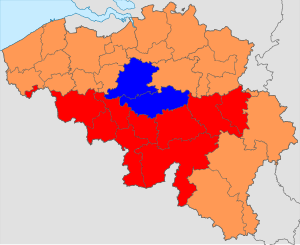
The politics of the Netherlands take place within the framework of a parliamentary representative democracy, a constitutional monarchy and a decentralised unitary state. The Netherlands is described as a consociational state. Dutch politics and governance are characterised by a common striving for broad consensus on important issues, within both of the political community and society as a whole.

The Christian Democratic Appeal is a Christian-democratic political party in the Netherlands. The CDA was originally formed in 1977 from a confederation of the Catholic People's Party, the Anti-Revolutionary Party and the Christian Historical Union, and has participated in all but three governments since then. Sybrand van Haersma Buma has been the Leader of the Christian Democratic Appeal since 18 May 2012.

Open Flemish Liberals and Democrats, commonly known as Open VLD or simply as the VLD, is a conservative-liberal Flemish political party in Belgium. The party was created in 1992 from the former Party for Freedom and Progress (PVV) and politicians from other parties. The party led the government for three cabinets under Guy Verhofstadt from 1999 until March 2008. Open VLD most recently formed the Federal Government with N-VA, CD&V and the Francophone Reformist Movement (MR).
The Liberal Reformist Party was a liberal political party active in the Walloon Region and Brussels in Belgium. The PRL grew out of the Francophone part of the unitary liberal Party for Freedom and Progress (PVV-PLP) in 1971, and merged into the Reformist Movement (RM) in 2002.
Regional elections were held in Belgium, to choose representatives in the regional councils of Flanders, Wallonia, Brussels and the German-speaking Community on 13 June 1999. The regional elections were held on the same day as the European elections and the federal elections.
The Party for Freedom and Progress was a liberal political party in Belgium which existed from 1961 until 1992. The party was the successor of the Liberal Party, which had roots dating back to 1846. It was succeeded in Flanders by the Flemish Liberals and Democrats (VLD) and in Wallonia by the Liberal Reformist Party, Parti des Réformes et des Libertés de Wallonie and the current-day Reformist Movement. In the German-speaking Community, it still exists as the Party for Freedom and Progress.

The Federal Government of Belgium exercises executive power in the Kingdom of Belgium. It consists of ministers and secretaries of state drawn from the political parties which form the governing coalition. The federal government is led by the Prime Minister of Belgium, and Ministers lead ministries of the government. Ministers together form the Council of Ministers, which is the supreme executive organ of the Government.

General elections were held in the Netherlands on 22 November 2006 following the fall of the Second Balkenende cabinet. The elections proved relatively successful for the governing Christian Democratic Appeal (CDA) which remained the largest party with 41 seats, a loss of only three seats. The largest increase in seats was for the Socialist Party (SP), which went from nine to 25 seats. The main opposition party, the social-democratic Labour Party (PvdA) lost nine of its 42 seats, while the right-liberal People's Party for Freedom and Democracy (VVD) and the progressive liberal Democrats 66 lost a considerable portion of their seats, six of 28 and three of six, respectively. New parties, such as the right-wing Party for Freedom (PVV) of former VVD MP Geert Wilders and the animal rights party Party for the Animals (PvdD) were also successful, with the PVV winning nine seats and the PvdD winning two, thereby becoming the first animal rights group to enter a European parliament.

Mark Rutte is a Dutch politician serving as the 50th and current Prime Minister of the Netherlands since 2010 and Leader of the People's Party for Freedom and Democracy since 2006. Rutte was previously appointed as State Secretary for Social Affairs and Employment from 22 July 2002 to 17 June 2004 and as State Secretary for Education, Culture and Science from 17 June 2004 until 27 June 2006, when he was elected to succeed Jozias van Aartsen as the new VVD Leader.

The 2007 Belgian federal election took place on Sunday 10 June 2007. Voters went to the polls in order to elect new members for the Chamber of Representatives and Senate.

The Fourth Balkenende cabinet was the cabinet of the Netherlands from 22 February 2007 until 14 October 2010. The cabinet was formed by the political parties Christian Democratic Appeal (CDA), Labour Party (PvdA) and the Christian Union (CU) after the election of 2006. The grand coalition cabinet was a majority government in the House of Representatives.
The European Parliament election of 2009 in the Netherlands took place on 4 June 2009. Seventeen parties competed in a D'Hondt type election for the available 25 seats. For the first time, all Dutch residents of the Netherlands Antilles and Aruba were also entitled to vote in the election.

General elections were held in the Netherlands on Wednesday, 9 June 2010. It was triggered by the fall of Prime Minister Jan Peter Balkenende's fourth cabinet on 20 February with Queen Beatrix accepting the resignation of the Labour Party ministers on 23 February. The conservative-liberal People's Party for Freedom and Democracy (VVD), led by Mark Rutte, won the largest number of seats in the House of Representatives while the social-democratic Labour Party (PvdA), led by Job Cohen, came a narrow second. It was also noted for the rise of the controversial politician Geert Wilders and the Party for Freedom (PVV), which came in third. On the other hand, the election was a poor result for Balkenende and his Christian Democratic Appeal (CDA), which lost half its seats and dropped from first to fourth place. The Socialist Party (SP) also lost seats. Notably, the 31 seats won by the VVD is the most in years, and the one-seat margin between the VVD and PvdA is the closest on record.

Sybrand van Haersma Buma is a Dutch politician serving as Leader of the Christian Democratic Appeal (CDA) since 30 June 2012. A member of the House of Representatives since 23 May 2002, he also serves as his party's parliamentary leader since 14 October 2010.

The First Rutte cabinet, also called the Rutte–Verhagen cabinet was the cabinet of the Netherlands from 14 October 2010 until 5 November 2012. The cabinet was formed by the political parties People's Party for Freedom and Democracy (VVD) and the Christian Democratic Appeal (CDA) after the election of 2010. The right-wing cabinet was a minority government in the House of Representatives but was supported by the Party for Freedom (PVV) for a majority. It was the first of three cabinets of Mark Rutte, the Leader of the People's Party for Freedom and Democracy as Prime Minister, with Maxime Verhagen the Leader of the Christian Democratic Appeal serving as Deputy Prime Minister.
The Party for Freedom is a Dutch nationalist and right-wing populist political party in the Netherlands.

The Verhofstadt II Government was the federal government of Belgium from 12 July 2003 to 21 December 2007.

Early general elections were held in the Netherlands on 12 September 2012 after Prime Minister Mark Rutte handed in his government's resignation to Queen Beatrix on 23 April. The 150 seats of the House of Representatives of the Netherlands were contested using party-list proportional representation. The People's Party for Freedom and Democracy (VVD) received a plurality of the votes, followed by the Labour Party (PvdA).

General elections were held in the Netherlands on Wednesday 15 March 2017 to elect all 150 members of the House of Representatives.


























